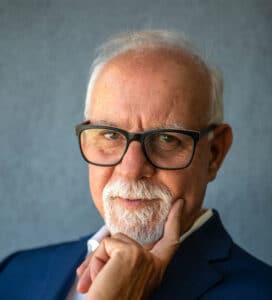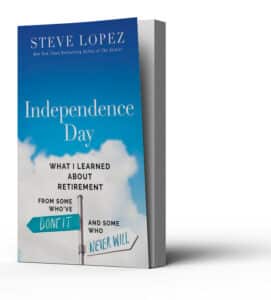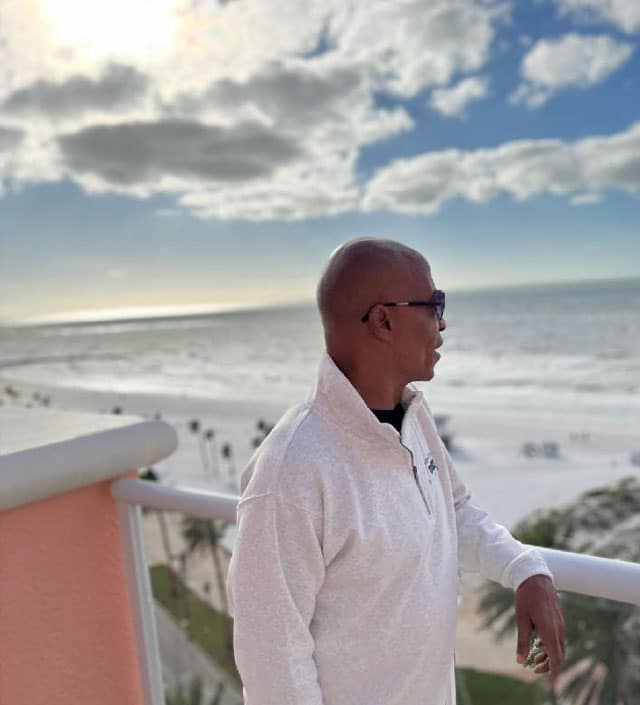“Mel Brooks was right.’’
Steve Lopez, veteran columnist for the Los Angeles Times, was looking for an answer to a nagging question, one that bedevils many as retirement looms: Should he keep working or retire?
Lopez, then 68, had award-winning entertainer/producer/writer/raconteur Brooks on the phone, a man not given to dithering. Lopez described to Brooks the many virtues of staying, including covering with a free rein Los Angeles and its multidimensional citizens who are brimming with interesting lives and fascinating stories.
On the other hand, as Lopez is wont to say, “I might want to see what it’s like to live in Spain for a while or on a kibbutz.’’
“Then do it,’’ Brooks said. “I’d say keep doing what you’re doing, but don’t do as much of it.’’
Brooks suggested Lopez cut back his hours at the newspaper, allowing him to keep writing but also to pursue other interests.
So that was that, right?

Nope. Brooks shows up on page 70 of Lopez’s new book, “Independence Day: What I Learned About Retirement,’’ which runs a tidy, humor-filled 240 pages. Before Lopez can ease into something like retirement, he asks dozens more LA citizens for advice on retiring, among them TV laureate Norman Lear, a woman rabbi, a slew of retirement villagers, a paralegal, the owner of fabled vineyards, the family of a newly deceased lifelong friend, a cherished editor, a priest, a therapist, a psychologist, and his wife and their daughter.
Wife Alison said, basically, “Don’t be hanging around here thinking we’ll be doing all sorts of things together. I’ve got my own activities and friends.”
“You’d kill each other,’’ said college-bound daughter Caroline, surmising that too much proximity between Mom and Dad was sure to be trouble.
Lopez gives himself one year from July 4, 2021 to decide whether to leave a plummy but demanding job. He figures he’d leave before his toenails yellowed and he needed hearing aids, plus he’d be young enough to travel and pursue those yearned-for new interests.
And this biggie:
“No more deadlines. I’m in the fifth decade of being ruled by deadlines, which require constant vigilance. In my job, you have to produce without excuse.’’
How much is enough?
Holding him back from retiring, besides habit and the suspicion that he has the best job in the world: money, or the lack of it, or the lack of a secure feeling about having enough. Also, he works at a newspaper, an incredibly shrinking pursuit that may not welcome him back if he changes his mind or wants to do part-time writing.
And, like some people who live long enough to be called “old”, Lopez is a “soldier in the fight against age discrimination.’’ He should still have a place on the newsroom roster, despite its thinning out and growing ever younger, right?
So, on page 7, he writes, “Me, retire? No thanks. I’m going to work until I die, even if it kills me, but not at my desk. I want the obituary to begin: ‘Steve Lopez died on the beat yesterday chasing a good story on a tight deadline. Cause of death was the exhilaration at the thought of tapping out the column, having a cold beer and then running out on the next one in a crusade that has no end.’’
 Lopez’s book unfolds like a cliffhanger: Will he or won’t he? It depends on the last person whom he speaks to. Particularly confusing in that regard was the paralegal who was thrilled to retire, but after Week 1, was bored to death, asked her boss if she could return, and did, but worked under a temporary employment agency contract, so made more money.
Lopez’s book unfolds like a cliffhanger: Will he or won’t he? It depends on the last person whom he speaks to. Particularly confusing in that regard was the paralegal who was thrilled to retire, but after Week 1, was bored to death, asked her boss if she could return, and did, but worked under a temporary employment agency contract, so made more money.
Lopez took all of his respondents’ yay or nay wisdom under advisement but was jarred into action by two specific events: the shocking death at 67 of his hearty lifelong friend and contemporary, Los Angeles Councilman Tom LaBonge, and, working on a story about climate change.
LaBonge’s untimely death made Lopez think, “OK, I gotta get outta here now, we’re the same age, it could have happened to me, too.
“Then I started to think, the thing about Tom was that his work was his purpose and his passion, and that is how work is for me,’’ he said.
Lopez got to pondering again about staying after writing a column about a desert ecologist researching the impact of climate change on the Joshua tree.
“He’s older than me but he was as engaged and excited by his work as I ever was. And he’s not retiring. So, what am I retiring from? I have a ticket to interview interesting people. I was leaning toward the Mel Brooks’ hybrid plan,’’ he said.
Nest-egg concerns and more
Having heard plenty of pros and cons about staying put or taking off, Lopez has developed a heightened appreciation for why so many wrangle with the “R word.”
“Let’s say you have it all planned out, but it’s a shaky market and you have financial concerns so retirement tends not to work if you don’t have financial security.
“Another factor for me was with the pandemic tearing up the market. My nest egg went down to a few twigs. I’m wondering if I can really afford to do this. Volatility in the markets and in those nest eggs makes people think, yes, they’re ready to retire, but they better hold off a little longer.
“The problem with that is, you have no way to know how long you will live. How does anybody know how much they need to live comfortably?’’
For all but the most financially secure, Lopez said, the less certainty one has about the quality of living until 90, 100 or beyond.
“We have no idea what kind of healthcare situations we may be in, we don’t know when the hurricane will blow the roof off the house. Unanticipated dips and market changes give me lot of anxiety.
Purpose and structure
“(Rabbi) Naomi Levy said there are people who need structure, and, a lot of people who need it, when they retire they find they don’t matter. All of a sudden no one is waiting for them to show up. I think people don’t think it through, and so they find ways to get back to work,’’ Lopez said.
Still, Lopez’s editor, Sue Horton, leapt at taking a buyout. Then there were other colleagues who feel, with the shrinking of the newspaper industry, they are lucky to still have a job, and they’re holding on for dear life.
“But the pandemic changed the rules of work and a lot of people started thinking about retiring,” he said. “People started to really examine what their work was about and whether they wanted to return when the office reopened. Some said they weren’t going back to the commute and the traffic. Our relationship to work and retirement is evolving right now. A lot of people know they have to answer these big questions.’’
The COVID-19-driven lockdown also gave Lopez a preview of what retirement would be like spent at his home near Pasadena, California.
“It’s quite true that retirement changes your relationships in ways that you might not have imagined. (Psychologist) Nancy Schlossberg told me that your relationships with colleagues, friends, your spouse — everything will change. Instead of the structure that’s been built into your weekly life, now you’re winging it. You have to manage more time with this person (spouse).
“When I told my wife I’d be here working at home, she said, ’If this is the preview, I don’t want to see the movie!’
“It’s quite a useful observation; she is a little bit younger than me and she’s so busy working, she worried I hadn’t built enough of a social network to occupy myself,” Lopez said.
Not to worry: When Lopez mentioned in a column that he was looking for fellow musicians to start a garage band — he’s returned to guitar playing and loving it — he received three responses, and he’s already discussing when and where to get going with one of the respondents.
No big surprise that Lopez learned about work when talking to others about retirement. In addition to his career as a columnist for the Los Angeles Times, he has been a reporter at the Philadelphia Inquirer, the San Jose Mercury News, the Oakland Tribune and Time magazine, and is a four-time Pulitzer Prize finalist for commentary. He received the Mike Royko, Ernie Pyle and H.L. Mencken awards for column writing.
“I left college on a Tuesday night in 1975, started work the next morning, and I haven’t stopped. It’s all I know and, what’s more important, it’s a big part of who I am,’’ he said of spending nearly 50 years in journalism.
“Working on the book gave me a greater appreciation for work. I am finding the book is as much a study of work and our relationship to it, as a study about how do you retire well. I just became more convinced that I am privileged to have the work that I do.’’
But since he’s in the “reinvention’’ phase of his life, Lopez decided he wanted to change the focus of his column. It’s now called Golden State, a meld of his home state of California’s nickname, and the concept of retirement being one’s golden years.
“I want to believe that approaching the milestone of 70 will be a continuation of reinventing myself, which is one reason I went back to the guitar. Maybe I’ll take up the piano, maybe I’ll live abroad.
A realistic look at aging
“But when you get to be my age, the golden years are not so golden. So, in the new column, I’m looking at the blessings and burden of age on a small scale. I’m hoping to profile people who are dealing with age. This is a time when many older people cannot afford housing and they have to make the tough choices like buying medicine or food.
“And there is a projected humongous shortage of healthcare workers. All of these things are coming at us and, in a few years, there will be more people aged 65 and older than any other age in the world. Many societies are not prepared for it. California is trying to catch up with a 10-year plan: healthcare and housing, equity issues.’’
In his book, Lopez writes about a profoundly life-changing experience. He’s applying that experience to his column.
“I had a cardiology appointment this week because I have heart issues. I turned it into a public service column about the benefits and concerns of new medical technology. There are watches that take your own EKG in 30 seconds, and you download it to your doctor. But what about the 80% of the population who can’t afford the watch?’’
Lopez has found people to fit into his new column’s niche. On the day he spoke with Rethinking65 about his new book, Lopez had to change the time of the call because he had a last-minute interview with an 89-year-old man. Lopez met the man at a batting cage in Los Angeles where the man was working on hitting the hardball 90 mph to celebrate his upcoming 90th birthday.
“He was hitting line drives all over the place. He’s inspiration for people who need to be reminded that even as you age, up into the 80s, 90s, it’s still possible to embrace life, to have new adventures and purpose.’’
And Lopez? He took Brooks’ advice and crafted a new contract with the Los Angeles Times: he’s working one-third fewer hours with a corresponding 33% pay cut.
“Every one of the dozens of people I talked to about retirement in the last year helped me make my decision, and I’m indebted to all of them,’’ he said.
“Independence Day,’’ by Steve Lopez. Harper Horizon. 240 pages.
In a four-decade career in journalism, Eleanor O’Sullivan has reviewed many books on best practices for financial advisors, has written for Financial Advisor and the USA Today network, and was movie critic for the Asbury Park Press.







